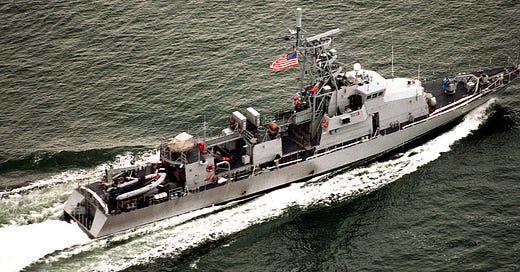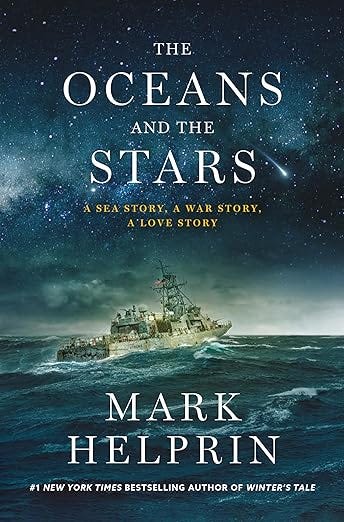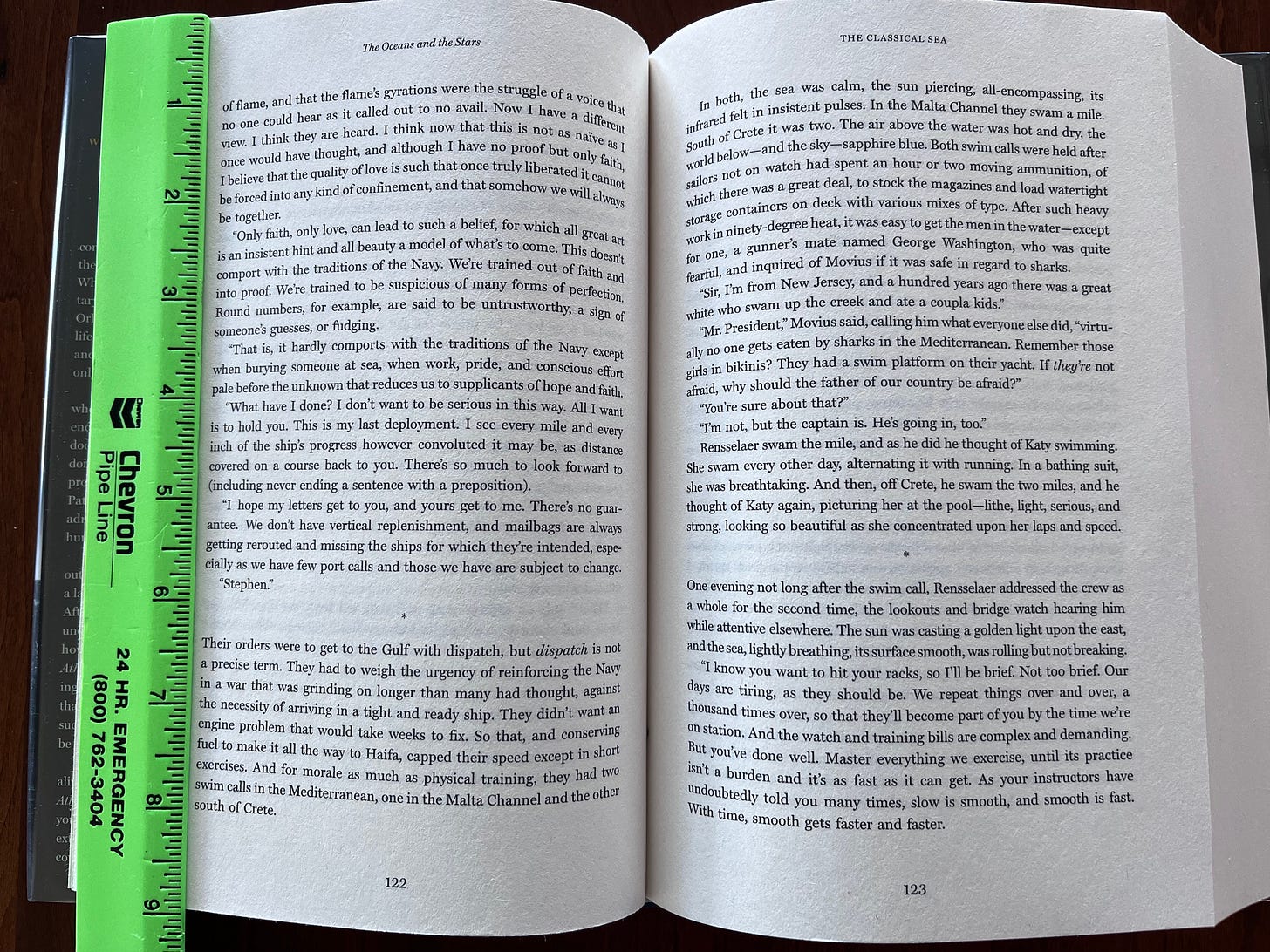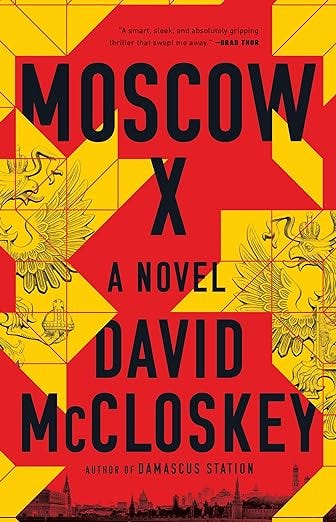What makes a book compelling? Join me in reading good books and honing the craft of writing.
It’s Free, so Subscribe and Enjoy!
One of the joys of fiction occurs when we get to draw in a story and apply it to our own lives. On the character level, we may sympathize with a character, may even walk in their shoes as the story progresses. On the story level, if we can relate a novel to current events, we enjoy the novel more and perhaps even expand our understanding of what’s going on.
Mark Helprin’s The Oceans and The Stars is a story timely meshing with the conflicts in the Middle East (including Houthi attacks on commercial shipping off Yemen). The subtitle of A Sea Story, A War Story, A Love Story is a pitch to a broad audience of men and women.
Stephen Rensselaer is a Navy Captain on track for promotion, recently assigned to the staff of the Secretary of the Navy, a political appointee. And this is where the troubles start, intersecting fiction with the events going on around us.
As we’ve seen in the news, the U.S. Navy is diminished from earlier times. Whether it’s due to fewer shipyards to build fewer ships allocated by Congress, labor shortages both in the shipyards and serving on ships, emphasis on non-fighting aspects of naval doctrine (culture shifts on gender, fuels), decline in weapons manufacturing and research, take your pick. Neglect runs everywhere, yet the Navy is called to do more in an ever more dangerous world.
The President (a fictional character) wants to get rid of the Navy’s coastal patrol (PC) ships, shallow draft craft meant for close-in shore support. In the real-world, the PC ships have all been decommissioned. In the story, the SecNavy, Freeland, disagrees, but as a political appointee is gutless to say so. Here is the beginning of their meeting, where Helprin slowly pulls the curtain back on Rensselaer’s Oh Oh moment:
“I’ve got fifteen minutes and then I’ve got to greet the president of Babylonia or some shit,” said the head of state. “I asked that we get rid of these little boats and get more big ones. And you say no. What’s the problem?” He was irritated, drumming his fingers against the arms of his chair.
As unruffled as an English butler, Freeland said, “We can certainly do that, Mr. President, but there might be repercussions.”
“Like what?”
“I’ve brought along Captain Rensselaer. He was a SEAL, he has a Harvard Ph.D., and he’s commanded a Patrol Coastal. With the CNO’s permission, perhaps he can comment.”
The CNO [Chief of Naval Operations] nodded.
As suddenly as falling off the edge of a cliff one hasn’t seen in the dark, Rensselaer knew he had been brought along as cannon fodder, or at the very least the big bumpers between a ship and a pier or a wharf that are known as camels. Rusty [his friend also at the meeting] had the same revelation, and she was glad herself was not to be sacrificed. Rensselaer was new at the SECNAV’s, and could be replaced without much loss of efficiency.
“Who the hell are you?” the president asked.
“Stephen Rensselaer, sir.”
“I like your shoulder stuff more than the Admirals’.” The CNO’s shoulder boards were gold and white and with thin blue edges. A Captain’s was blue with four gold stripes and a star. “It looks more naval.” The president turned to the CNO. “Frank, yours is kinda wishy-washy, almost effeminate. We should do something about that.”
The CNO’s lips moved very, very slightly, until finally he said, “Sir.”
Unlike the Secretary, the CNO is career navy. The Pres isn’t done disrespecting his uniformed audience:
Turning back to Rensselaer, the president asked, “Rensselaer. Is that . . . that’s Dutch, isn’t it?”
“Yes sir, in origin. American since sixteen fifty-one.”
“In the Hudson Valley.”
“Yes sir.”
“Aristocrats.” This was not said in a friendly fashion.
“No sir, not since seventeen seventy-six.”
“Well, it tends to linger, doesn’t it,” the president declared quite nastily, and as if he had won the point merely by his rhetorical question.
“Not in my family sir.”
“Oh? Harvard?”
“The Naval Academy, sir, and then Harvard.”
“As I said, it tends to linger.”
“No sir, with all due respect. Where I come from, Columbia County, there are Rockefellers who are poor. One even died in Vietnam. My father was a foundryman upriver in Troy. My mother was a nurse. They weren’t aristocrats and neither am I.”
Already, Rensselaer, the mere captain, had argued with the president.
Don’t be afraid to reread the passages to gain a better sense for Helprin’s craft of ratcheting the conflict between a prickly, disrespectful president and a naval officer proud of who he is no matter the detractor.
This president had no memory problems, is angry at the push-back and banishes Rensselaer to command a new Patrol Coastal ship. It’s a demotion by several levels and leads Rensselaer to the Middle East, where the U.S. Navy is tasked with taking on the Iranians.
Sound familiar? Today, the U.S. Navy has ships in the Red Sea and Indian Ocean keeping shipping lanes open past Iranian-backed pirates/troublemakers/proxies.
Renesselaer works with what he has, even to the point of taking on a much stronger adversary on what could well be a suicide voyage. It’s because the Navy is stretched so thin that his little ship is called upon for such a major task.
The story is about the spirit and action of those we ask to defend us when bullets start flying. The shooters don’t care about culture politics- gender, green fuels, etc. Neither do the sailors who must respond to survive.
The question Helprin puts to us readers, as Rensselaer is later court-martialed for his actions, do we, as a country provide our fighting sailors with what they need to do the job we ask of them, a job that politics all-too-often muddies?
It’s worth some thought.
Speaking of shortchanging, the one complaint I have is with the print copy. The publisher wanted to: Save on trees? Support optometrists? Perform the literary equivalent of cramming a Volkswagen with as many people as possible? The print is annoyingly tiny.
I’d recommend the ebook.
Karl Marlantes wrote the classic Matterhorn, a tale about an ambitious lieutenant hitting the jungle in Vietnam and learning the hard way. His new book Cold Victory is on my TBR list. An historical fiction, it mixes the Cold War with personal friendship as two wives of military attachés, one American, the other Russian, both skiers, meet in 1947 Finland at a party and drunkenly challenge each other to a secret cross-country race.
David McCloskey wrote Moscow X, a spy thriller about a CIA operation against Putin’s Kremlin, where two officers go undercover into Russia and encounter more than they bargained for. Also on my TBR list.
All the Best,
Geoff
If you enjoyed this post, please hit the heart “❤️” so others can find it. It’s at the bottom and at the top.









Liked the analysis Geoff. Relates to today's problems with lack of support of our Armed Services